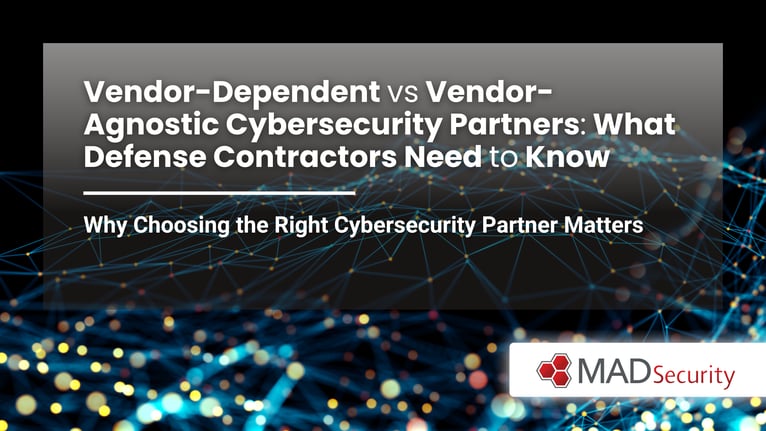
Why Choosing the Right Cybersecurity Partner Matters
 In the defense industrial base (DIB), choosing the right cybersecurity partner isn’t just a business decision; it’s a mission-critical one. A single compliance gap or misaligned control can cost your organization its contracts, damage hard-earned trust, and expose sensitive Controlled Unclassified Information (CUI) to risk. That’s why it’s essential to understand whether your current or prospective partner is vendor-dependent or truly vendor-agnostic.
In the defense industrial base (DIB), choosing the right cybersecurity partner isn’t just a business decision; it’s a mission-critical one. A single compliance gap or misaligned control can cost your organization its contracts, damage hard-earned trust, and expose sensitive Controlled Unclassified Information (CUI) to risk. That’s why it’s essential to understand whether your current or prospective partner is vendor-dependent or truly vendor-agnostic.
Many managed security service providers (MSSPs) operate under a vendor-dependent model, promoting a single technology stack or prepackaged solution that may not fit your organization’s size, budget, or compliance maturity. These one-size-fits-all approaches often lead to vendor lock-in, inflated costs, and overlooked compliance requirements. A vendor-agnostic cybersecurity partner, on the other hand, puts your compliance and security goals first; assessing your systems, identifying real risks, and recommending solutions that integrate with your existing architecture.
To determine whether your cybersecurity partner truly supports your compliance journey, start by evaluating how they recommend and implement technology.
Does the Consultant Recommend a Fixed Technology Stack?
One of the most telling signs of a vendor-dependent provider is a fixed technology stack. These providers often promote a single ecosystem such as Microsoft GCC High or AWS without first evaluating whether it fits your current environment or compliance needs. This approach creates unnecessary complexity, inflated costs, and limits scalability.
A vendor-agnostic MSSP takes a flexible, needs-first approach. They assess your infrastructure, compliance requirements, and goals before making any recommendations. By adapting to your unique environment, they ensure every solution supports compliance and operational efficiency.
Tip: Ask if your consultant supports multiple platforms or only one. If their response locks you into a single ecosystem, it’s a red flag.
Are Recommendations Based on Your Environment and Goals?
-1.png?width=300&height=169&name=MAD%20SEC%20HubSpot%20Blog%20Images%20(2)-1.png) Every defense contractor’s IT environment, resources, and compliance maturity are different. A trusted cybersecurity consultant starts by understanding your infrastructure, workflows, budget, and long-term objectives. They take a discovery-first approach, ensuring every control, policy, and security tool aligns with your organization’s real-world needs.
Every defense contractor’s IT environment, resources, and compliance maturity are different. A trusted cybersecurity consultant starts by understanding your infrastructure, workflows, budget, and long-term objectives. They take a discovery-first approach, ensuring every control, policy, and security tool aligns with your organization’s real-world needs.
Vendor-dependent providers often skip this step, pushing pre-selected tools before understanding your challenges. These “tool-first” conversations signal a sales-driven model that may fail to address key compliance gaps.
A vendor-agnostic partner begins with context not code. They analyze your systems, identify risks, and design a roadmap that supports measurable improvements in security and audit readiness.
Tip: Look for consultants who ask thoughtful questions about your workflows and infrastructure. If they jump straight to tools, they’re not focused on your mission.
Are Solutions Scalable and Flexible for Future Changes?
Compliance isn’t static; it evolves as threats and regulations change. CMMC, DFARS, and NIST 800-171 requirements are continuously refined, meaning your cybersecurity framework must be scalable and sustainable.
Vendor-dependent solutions often lack this adaptability. When your requirements shift, rigid tools can quickly become obsolete or costly to replace. A vendor-agnostic approach ensures scalability through interoperable, modular solutions that integrate with new technologies and frameworks.
Tip: Ask how easily proposed solutions can evolve alongside your organization’s needs. True partners plan, not just for deployment.
Does the Approach Minimize the Risk of Vendor Lock-In?
.png?width=300&height=169&name=MAD%20SEC%20HubSpot%20Blog%20Images%20(3).png) Vendor lock-in increases long-term costs and restricts flexibility. Once a provider builds your security architecture around proprietary tools, it becomes difficult to migrate without major disruption. A vendor-agnostic MSSP ensures your systems remain interoperable and swappable. By using open standards and adaptable architectures, they protect you from dependence on one platform. This flexibility promotes long-term cost efficiency and compliance continuity.
Vendor lock-in increases long-term costs and restricts flexibility. Once a provider builds your security architecture around proprietary tools, it becomes difficult to migrate without major disruption. A vendor-agnostic MSSP ensures your systems remain interoperable and swappable. By using open standards and adaptable architectures, they protect you from dependence on one platform. This flexibility promotes long-term cost efficiency and compliance continuity.
Tip: Ask how difficult it would be to replace a recommended tool. If migration sounds complicated or costly, you may be facing vendor lock-in.
Are Services Cost-Optimized or Bundled with Extras?
Vendor-dependent providers often inflate costs by bundling unnecessary tools and services. These add-ons rarely contribute directly to your compliance outcomes and can strain your budget.
Vendor-agnostic partners take a cost-transparent, compliance-first approach. They align every recommendation with your goals and budget, ensuring every dollar spent improves audit readiness, documentation, and risk reduction.
Tip: Always confirm that each tool or service contributes directly to your compliance objectives. Transparency is a hallmark of a true partner.
Is the Consultant Focused Solely on Compliance Success?
.png?width=300&height=169&name=MAD%20SEC%20HubSpot%20Blog%20Images%20(4).png) In the defense contracting world, cybersecurity isn’t just about tools; it’s about maintaining eligibility for contracts and proving compliance. The right partner focuses on your long-term security maturity and audit readiness, not on product sales.
In the defense contracting world, cybersecurity isn’t just about tools; it’s about maintaining eligibility for contracts and proving compliance. The right partner focuses on your long-term security maturity and audit readiness, not on product sales.
Vendor-agnostic providers measure success by your compliance achievements not by licenses sold. They document controls, gather evidence, and ensure your organization is always assessment ready.
Tip: Ask how your consultant measures success. The answer should be about your outcomes, not their revenue.
MAD Security’s Vendor-Agnostic Approach
At MAD Security, we believe cybersecurity success begins with independence. As a CMMC Registered Provider Organization (RPO), we deliver compliance-first, vendor-agnostic services tailored to defense contractors across the DIB.
We don’t resell vendor products; we focus on strategy, alignment, and measurable outcomes. Our team integrates seamlessly with your systems, whether you operate in Microsoft GCC High, AWS GovCloud, or hybrid environments.
Our core services include:
| Managed Security Operations Center (SOC): Continuous detection and monitoring aligned with compliance standards. | |
| Virtual Compliance Management (VCM): Expert advisory and documentation support for ongoing compliance. | |
| Incident Response and Threat Mitigation: Rapid response and recovery designed to minimize downtime and risk. |
Every engagement follows our Completely MAD Security Process, ensuring practical, evidence-based recommendations that align with your compliance roadmap.
Our mission is clear: simplify compliance, strengthen security, and help defense contractors achieve and maintain certification success.
Your Compliance Journey Deserves the Right Partner
Choosing the wrong partner risks your compliance, security, and scalability. A vendor-dependent consultant may lock you into rigid solutions that can’t adapt to evolving DoD requirements, leaving your organization vulnerable when regulations change.
Your compliance journey deserves a partner focused on your mission not a sales quota. A vendor-agnostic MSSP like MAD Security ensures every recommendation, control, and service aligns with your long-term compliance success.
Use our Vendor-Dependent vs. Agnostic Partner Evaluation Checklist to determine whether your current provider truly has your best interests in mind.
Schedule a Security and Compliance Strategy Session with MAD Security to learn how a vendor-agnostic, compliance-first approach can simplify your certification path, protect your contracts, and safeguard your mission.
Frequently Asked Questions (FAQs)
What does it mean to work with a vendor-agnostic cybersecurity partner?
A vendor-agnostic cybersecurity partner is independent from software or technology resellers. Instead of pushing one specific tool or product, they tailor solutions based on your environment, compliance requirements, and risk profile. This approach ensures flexibility, scalability, and alignment with frameworks like CMMC, DFARS, and NIST 800-171.
How can vendor dependency impact CMMC and DFARS compliance?
Vendor dependency can limit your organization’s ability to adapt to changing compliance requirements. Providers locked into one technology stack often overlook evidence-based documentation or unique system needs critical elements for CMMC Level 2 certification and DFARS 7012 adherence. This can lead to compliance gaps and failed assessments.
Why is vendor lock-in a cybersecurity risk for defense contractors?
Vendor lock-in occurs when your systems rely heavily on one vendor’s tools or licenses, making it difficult to switch providers or scale securely. This can increase long-term costs, reduce operational flexibility, and hinder your ability to meet new DoD cybersecurity standards.
What are the advantages of MAD Security’s vendor-agnostic approach?
As a CMMC Registered Provider Organization (RPO), MAD Security provides compliance-first cybersecurity services that integrate with your existing environment whether it’s Microsoft GCC High, AWS GovCloud, or hybrid infrastructures. Our SOC, VCM, and incident response solutions are designed to simplify compliance, strengthen security, and prevent vendor lock-in.
How can I evaluate if my cybersecurity partner is vendor-agnostic?
Use MAD Security’s Vendor-Dependent vs. Agnostic Partner Evaluation Checklist to assess your current provider. Ask whether they:
1. Recommend multiple technology options
2. Base advice on your environment and goals
3. Avoid sales quotas or vendor partnerships
4. Offer scalable, interoperable solutions
If the answer to any of these is “no,” you may be dealing with a vendor-dependent provider.
Original Published Date: October 09, 2025
By: MAD Security


